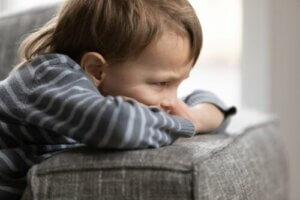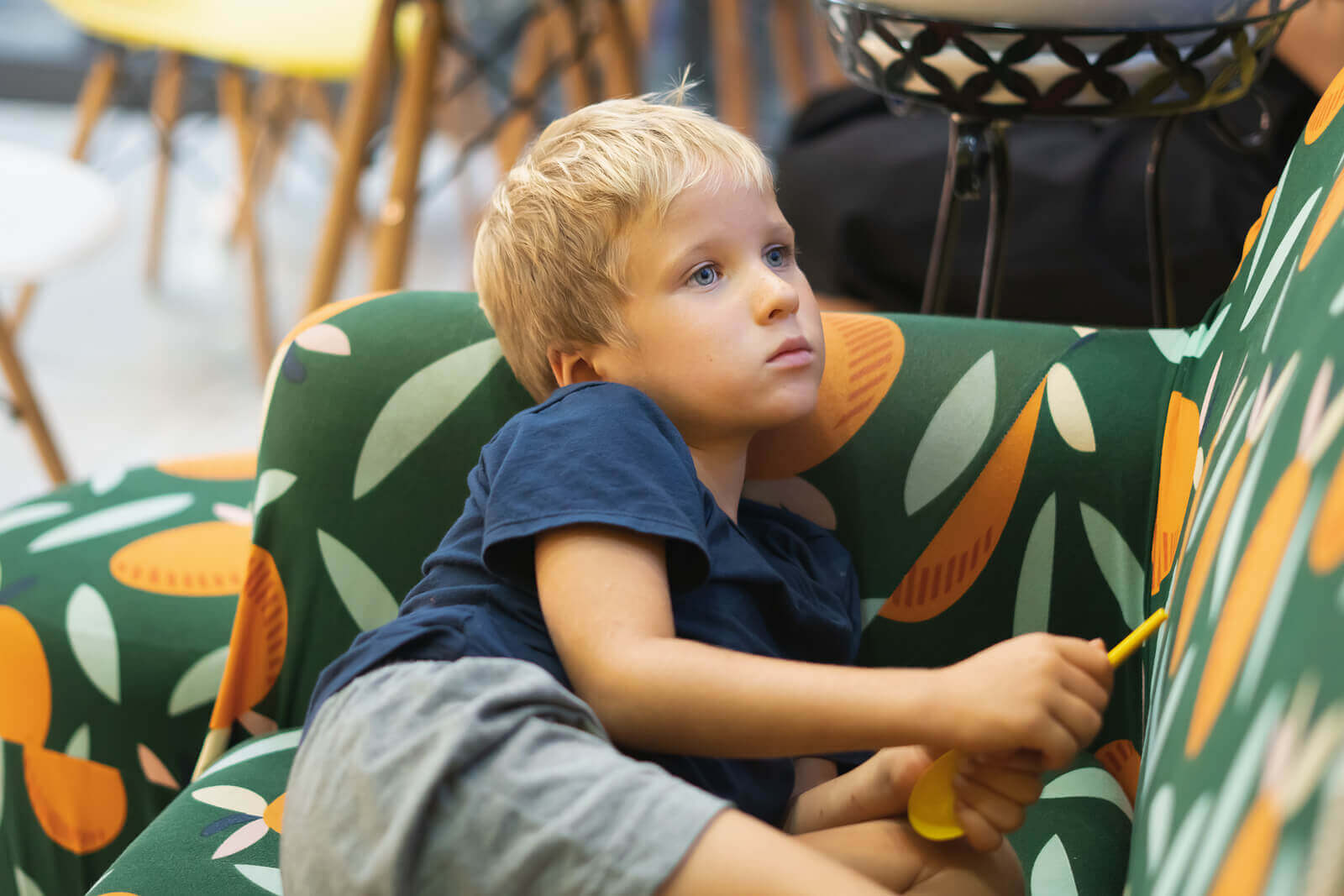5 Misbehaviors in Children that We Shouldn't Allow


Written and verified by the psychologist Mara Amor López
Sometimes our children have inappropriate behaviors that upset us as parents. Below we’ll address some of the misbehaviors in children that we shouldn’t allow, and what consequences we should apply if they appear.
Children are continuously learning about all sorts of issues. But there’s one area that’s very important in their education: Knowing which behaviors are appropriate and which are not.
A challenge for parents is to establish those limits that will guide their child towards acceptable behaviors and that, as part of their development, children will try to overstep.
Misbehaviors in children: What should we do?
At certain times, parents may be more tolerant or passive about certain behaviors. This often depends on the mood we’re in at the time.
With this, all we do is transmit a contradictory message to our children. Why does the same behavior have different results depending on the place where it takes place? This is something that we mustn’t allow. Certain behaviors must always have the same consequences, no matter what the case.

We always need to correct our children when it comes to inappropriate behaviors. However, there are certain behaviors that we can’t ignore under any circumstances. That’s because they can become a problem for them, for us, or for those around them.
It’s crucial that we are firm and establish consequences regarding their behavior. This will ensure that, as they grow up, they avoid them.
Misbehaviors that we shouldn’t allow in children
Below, we’ll look at some of the misbehaviors that we shouldn’t allow or condone under any circumstances.
Taking objects that aren’t theirs
Sometimes children really want something and, even though it’s not theirs, they take it. It’s important that we make them understand that no matter how much they want something, they can’t take it if it’s not theirs. This is fundamental, since it has to do with the values of respect, honesty and fairness.
Consequences
If you catch our child taking something that isn’t theirs, you have to talk to them. Explain that they shouldn’t do that, ask them to return it, and make sure they do. Even if they object and it’s not easy, they need to know what’s right.
Upsetting others for no reason
Children often get into arguments or fights with their peers over a toy, for example. This is completely normal. However, the real problem arises when our child bothers or harms another child for no reason. When this happens, it’s important that we identify what’s going on and act immediately.
Consequences
Once you’re sure that there’s no reason for this behavior, you have to talk to your child. Get them to think about what’s led them to behave this way and tell you what’s happened. Then, ask them to write a letter of apology and give it personally to the child they’ve upset.
Making fun of those who are different
It’s normal for children to ask about other children they see with a disability or something about someone’s physical appearance that catches their attention. However, we can’t allow them to point at others, laugh at them, or make fun of them.
We, as parents, must help them understand that we’re are all equal and that we must respect and accept others as they are. We have to foster in them values such as empathy and sensitivity, which will make them good-hearted people.
Consequences
With regard to this behavior, we mustn’t let them make fun of anyone. And, if they do, we must correct them and explain that this isn’t okay. From a young age, we must instill the acceptance and inclusion of those who are different. At the same time, we need to help our children realize how they can make others feel when they make fun of them.
Reading stories or watching movies about this topic can help you promote the importance of these values.
More misbehaviors that we shouldn’t allow in children

Excluding other children
If you see or hear that your child is excluding other children, it’s important that you stop this situation as soon as possible. At the same time, you need to work with them to develop empathy, conscientiousness, and sensitivity to others.
Consequences
Here, we must make sure that, after having a conversation with our little one, the situation doesn’t repeat itself. In addition, we can ask them to include the child they’ve excluded so that they don’t remain outside the group again because of this attitude.
Disrespecting authority figures and breaking objects when they’re angry or frustrated
Sometimes little ones find it difficult to manage their emotions, just as we adults do. However, there are some children whose reactions are explosive and excessive. They scream, hit those around them, and even break objects within their reach. You can’t tolerate this behavior and you have to work with your child as soon as these behaviors appear.
Consequences
The consequences here will depend on your child’s age and the intensity of the behavior. Wait until your little one is calm to talk about the situation.
You can provide strategies for handling anger and those overreactions. For example, relaxation techniques, breathing, taking a time out, expressing how they feel, etc.
In addition to establishing the consequences of these behaviors (loss of some privilege that they enjoy a lot, for example), in case they’ve broken something, they’ll have to spend part of their savings to replace or repair it.
In short, we shouldn’t let children’s bad behaviors go by, but the ones we have just mentioned are especially delicate and can’t be tolerated because they imply doing harm – to oneself, to others, and their environment.
It’s important to always establish the consequences that these behaviors will bring about and try to make sure to enforce them, no matter where they occur and with whom. You have to be firm when dealing with these bad behaviors so that they don’t happen again in the future. And of course, always talk with your child and enforce consequences with love and respect.
Sometimes our children have inappropriate behaviors that upset us as parents. Below we’ll address some of the misbehaviors in children that we shouldn’t allow, and what consequences we should apply if they appear.
Children are continuously learning about all sorts of issues. But there’s one area that’s very important in their education: Knowing which behaviors are appropriate and which are not.
A challenge for parents is to establish those limits that will guide their child towards acceptable behaviors and that, as part of their development, children will try to overstep.
Misbehaviors in children: What should we do?
At certain times, parents may be more tolerant or passive about certain behaviors. This often depends on the mood we’re in at the time.
With this, all we do is transmit a contradictory message to our children. Why does the same behavior have different results depending on the place where it takes place? This is something that we mustn’t allow. Certain behaviors must always have the same consequences, no matter what the case.

We always need to correct our children when it comes to inappropriate behaviors. However, there are certain behaviors that we can’t ignore under any circumstances. That’s because they can become a problem for them, for us, or for those around them.
It’s crucial that we are firm and establish consequences regarding their behavior. This will ensure that, as they grow up, they avoid them.
Misbehaviors that we shouldn’t allow in children
Below, we’ll look at some of the misbehaviors that we shouldn’t allow or condone under any circumstances.
Taking objects that aren’t theirs
Sometimes children really want something and, even though it’s not theirs, they take it. It’s important that we make them understand that no matter how much they want something, they can’t take it if it’s not theirs. This is fundamental, since it has to do with the values of respect, honesty and fairness.
Consequences
If you catch our child taking something that isn’t theirs, you have to talk to them. Explain that they shouldn’t do that, ask them to return it, and make sure they do. Even if they object and it’s not easy, they need to know what’s right.
Upsetting others for no reason
Children often get into arguments or fights with their peers over a toy, for example. This is completely normal. However, the real problem arises when our child bothers or harms another child for no reason. When this happens, it’s important that we identify what’s going on and act immediately.
Consequences
Once you’re sure that there’s no reason for this behavior, you have to talk to your child. Get them to think about what’s led them to behave this way and tell you what’s happened. Then, ask them to write a letter of apology and give it personally to the child they’ve upset.
Making fun of those who are different
It’s normal for children to ask about other children they see with a disability or something about someone’s physical appearance that catches their attention. However, we can’t allow them to point at others, laugh at them, or make fun of them.
We, as parents, must help them understand that we’re are all equal and that we must respect and accept others as they are. We have to foster in them values such as empathy and sensitivity, which will make them good-hearted people.
Consequences
With regard to this behavior, we mustn’t let them make fun of anyone. And, if they do, we must correct them and explain that this isn’t okay. From a young age, we must instill the acceptance and inclusion of those who are different. At the same time, we need to help our children realize how they can make others feel when they make fun of them.
Reading stories or watching movies about this topic can help you promote the importance of these values.
More misbehaviors that we shouldn’t allow in children

Excluding other children
If you see or hear that your child is excluding other children, it’s important that you stop this situation as soon as possible. At the same time, you need to work with them to develop empathy, conscientiousness, and sensitivity to others.
Consequences
Here, we must make sure that, after having a conversation with our little one, the situation doesn’t repeat itself. In addition, we can ask them to include the child they’ve excluded so that they don’t remain outside the group again because of this attitude.
Disrespecting authority figures and breaking objects when they’re angry or frustrated
Sometimes little ones find it difficult to manage their emotions, just as we adults do. However, there are some children whose reactions are explosive and excessive. They scream, hit those around them, and even break objects within their reach. You can’t tolerate this behavior and you have to work with your child as soon as these behaviors appear.
Consequences
The consequences here will depend on your child’s age and the intensity of the behavior. Wait until your little one is calm to talk about the situation.
You can provide strategies for handling anger and those overreactions. For example, relaxation techniques, breathing, taking a time out, expressing how they feel, etc.
In addition to establishing the consequences of these behaviors (loss of some privilege that they enjoy a lot, for example), in case they’ve broken something, they’ll have to spend part of their savings to replace or repair it.
In short, we shouldn’t let children’s bad behaviors go by, but the ones we have just mentioned are especially delicate and can’t be tolerated because they imply doing harm – to oneself, to others, and their environment.
It’s important to always establish the consequences that these behaviors will bring about and try to make sure to enforce them, no matter where they occur and with whom. You have to be firm when dealing with these bad behaviors so that they don’t happen again in the future. And of course, always talk with your child and enforce consequences with love and respect.
All cited sources were thoroughly reviewed by our team to ensure their quality, reliability, currency, and validity. The bibliography of this article was considered reliable and of academic or scientific accuracy.
- Foster, S. L., Brennan, P., Biglan, A., Wang, L., & al-Gaith, S. (2006). Prevención de problemas de conducta: lo que sí funciona. CENEVAL. https://0201.nccdn.net/1_2/000/000/181/004/Prevencion-de-problemas-de-conducta.pdf
- Barrera, D., Restrepo, C., Labrador, C., Niño, G., Díaz, D., Restrepo, D., … & Mancera, B. (2006). Medio familiar y entorno escolar: detonantes y antídotos de las conductas agresivas en niños en edad escolar. Persona y bioética, 10(2), 99-107. http://www.scielo.org.co/scielo.php?script=sci_arttext&pid=S0123-31222006000200006
This text is provided for informational purposes only and does not replace consultation with a professional. If in doubt, consult your specialist.








